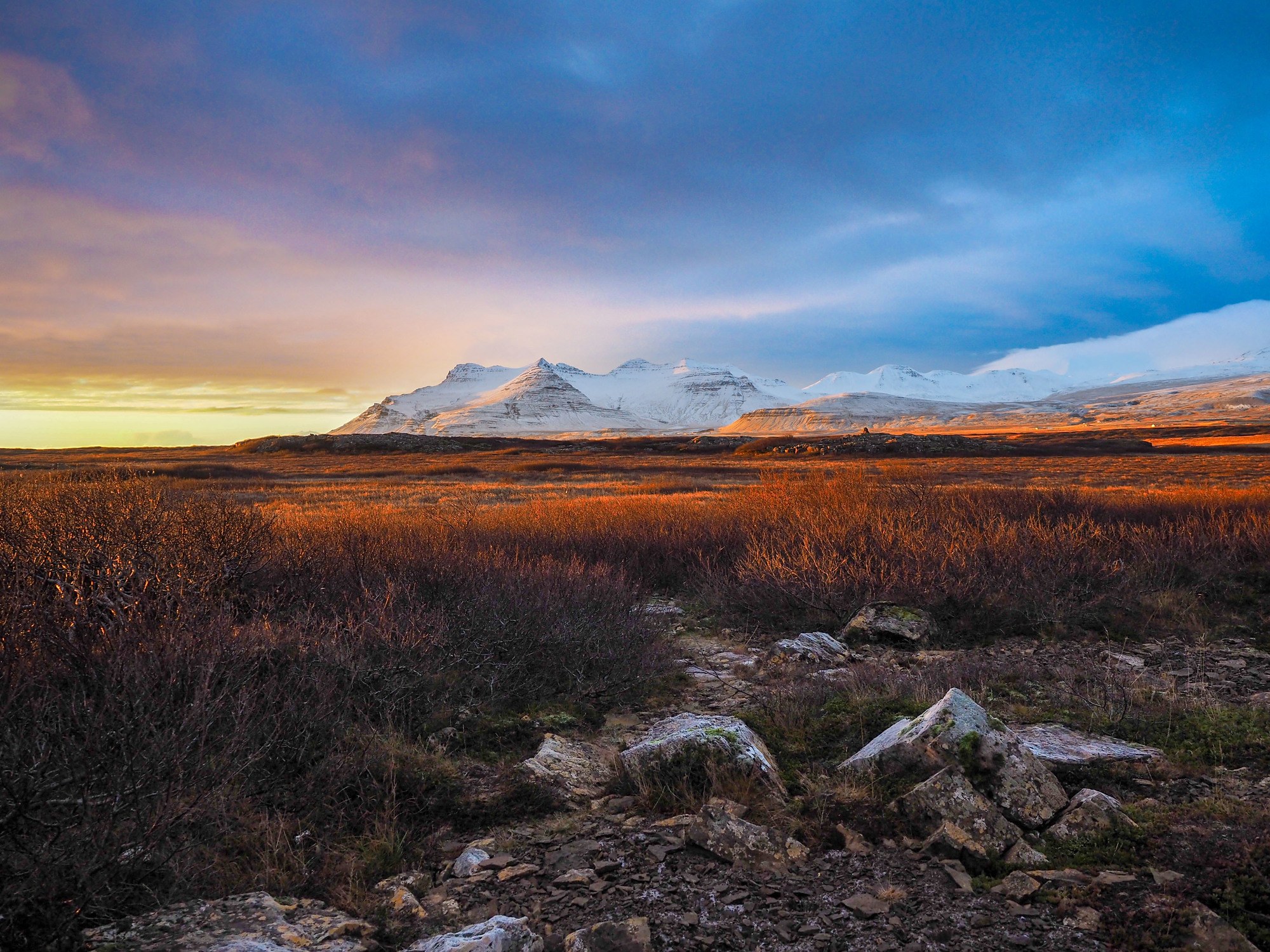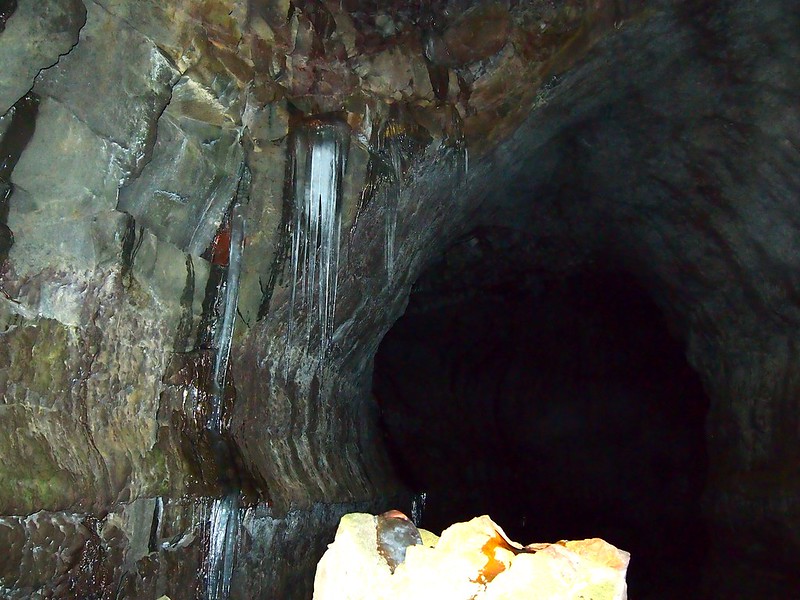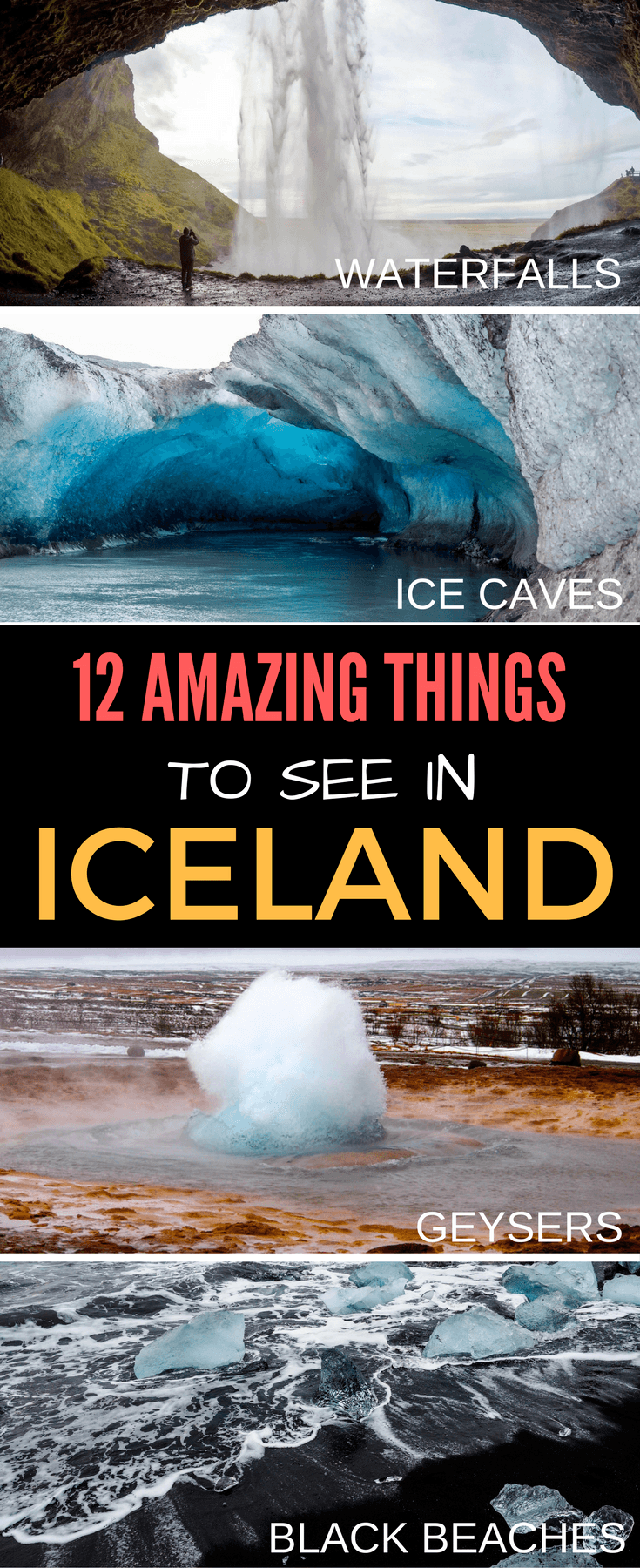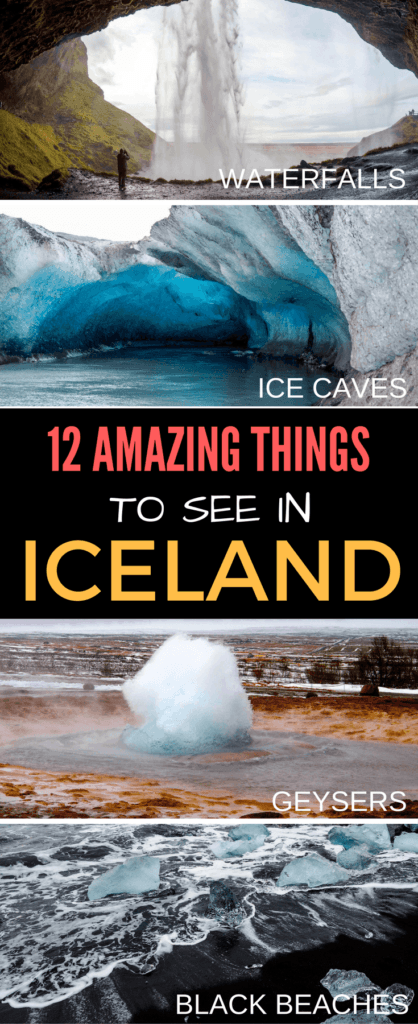12 Crazy But Cool Things You Can See in Iceland

Iceland is known as the Land of Fire and Ice, due to the fact that it's been shaped and carved by both volcanoes AND glaciers. This unique combination has made Iceland's landscape otherworldly.
Which is probably why Iceland has become such a hot travel destination; it's just so different from anywhere else.
If you're planning a trip to Iceland anytime soon, here are just a few of the crazy-but-so-incredibly-cool things that you can expect to find there:
The coolest things you can see in Iceland
1. Black beaches
Iceland's volcanic past (and present) means that you won't find white sand on any of its wild beaches; instead, you'll find either a thick layer of fine volcanic ash, or sea-smoothed shards of grey-black lava rock.
These black beaches are certainly striking, but I wouldn't recommend swimming at many of them – the currents can be extremely dangerous!
Some of the best black-sand beaches to visit include:
- Reynisfjara – Located on the South Coast of Iceland near the small village of Vík, this beach is known for its towering basalt columns and ominous sea stacks. Just beware the crashing waves here – people have died getting swept away!
- Jökulsárlón Beach – Often called “Diamond Beach,” this beach is where you can find remnants of the small icebergs that continually break off the glaciers in Vatnajökull Glacier National Park. The ice chunks get worn down by the sea (and sometimes the sun), often making them gleam like diamonds on the black sand.
- Stokknes – Further along the South Coast near the town of Hofn you'll find an area called Stokknes. While the weather can be wild and windy here, you'll find a long black sand beach with views of Vestrahorn mountain.
- Djúpalónssandur – Found on the Snæfellsnes Peninsula in western Iceland, this black sand beach is known for the shipwreck of an old fishing trawler. Again, don't get too close to the water here, as the waves and currents are dangerous! (Hence the shipwreck…)
2. Geysers
Geysers can only be seen in a few places in the world. You may have heard of the most famous ones in Yellowstone National Park in the US, or maybe in the Valley of Geysers in Russia, but Iceland has its own famous geyser field at Haukadalur.
In fact, it was here that the word “geyser” was coined. The Great Geysir was the first geyser known to Europeans, with the word “geyser” being adapted from the Icelandic “geysir,” which means “to gush” in Old Norse.
That specific geyser is no longer active, but nearby Strokkur erupts consistently every 5-8 minutes.
(This is a popular stop along Iceland's “Golden Circle” route.)
3. Waterfalls you can walk behind
Iceland is also known for its waterfalls. Waterfalls surrounded by basalt columns; waterfalls that flow out of lava fields; waterfalls that are more powerful than any others in Europe (that would be Dettifoss specifically).
And waterfalls that you can walk behind.
One of the most famous waterfalls along Iceland's South Shore is Seljalandsfoss. The thin stream of water flows year-round, and visitors who don't mind getting wet can walk under a cliff overhang and hang out behind the waterfall.
This waterfall is fairly easy to access (you don't need a 4WD car to reach it, and you don't have to hike that far), making it one of the more popular waterfalls in Iceland to visit.
4. Glaciers on top of volcanoes
Remember the whole “fire and ice” thing? Yeah, well today many of Iceland's glaciers sit atop volcanoes – and not all of them are extinct. In fact, nearly 60 percent of the volcanic eruptions in Iceland occur beneath glacial ice.
So if you go for a glacier hike in Iceland, just be aware that you're likely also hiking above a volcano.
The most notorious of Iceland's subglacial volcanoes is Katla, and she's overdue for an eruption.
5. A rift between tectonic plates
Part of the reason Iceland is so geothermally active is because it sits directly atop the Mid-Atlantic Ridge. Two of Earth's tectonic plates – the Eurasian plate and the North American plate – are separating beneath Iceland, slowly pulling the country apart.
And Iceland is one of only two places in the entire world where you can see two tectonic plates meeting (or, in this case, separating) above the earth's surface. You can see the edges of both plates in Þingvellir National Park, and you can even go diving/snorkeling between the plates in nearby Þingvallavatn lake. (This is an EPIC thing to do in Iceland, and I highly recommend it!)
RELATED: Snorkeling Silfra: Swimming Between Tectonic Plates in Iceland
6. Elf houses
Crazy as it may seem to someone from America (where people seem to be skeptical of absolutely everything these days), the majority of Icelanders (more than 50%, I was told) believe in the existence of fantastical beings such as elves and trolls.
There are many amusing stories and legends about the Huldufólk, or “hidden people,” and Icelanders go so far as to suspend construction projects if it's believed that the plans may interfere with or endanger current elf habitats.
Large fallen rocks in fields or out at sea are said to be frozen trolls, and one guide told me that the smell present in Iceland isn't from sulphur at all – it's the smell of the trolls' dirty bath water!
As you travel around Iceland, keep an eye out for the tiny houses built in gardens or simply in the middle of nowhere as homes for the elves.
7. Lava tube caves

Lots of volcanoes of course means lots of lava. And lava is a pretty powerful thing.
All over Iceland, you can find tubes and caves that were formed during ancient lava flows. I wouldn't recommend exploring these spots on your own (they can be dark, slippery, and quite dangerous), but if you have the chance to visit with a guide, go for it! It isn't every day, after all, that you can climb down into a tunnel that was formed by molten lava.
8. Caves made of ice
Speaking of cool caves, during the winter months you can also go into caves made of ice!
Beneath Vatnajökull (the largest glacier in Iceland), blue ice caves form during the winter months. Again, these aren't something you should explore on your own – ice can be even more dangerous than water, and glaciers are always shifting!
But a handful of tour operators have popped up in South Iceland to offer tours to the biggest and best ice caves each season, so take advantage if you're visiting at the right time of year! (Here's a tour to Crystal Cave.)
9. Hot springs
Iceland's geothermal activity means that there are tons of natural hot pools all over the country. Some are marketed as tourist destinations (like the Mývatn Nature Baths or the Secret Lagoon in Fludir), while others are truly natural and usually just stumbled upon or found by people in-the-know.
(There's also the famous Blue Lagoon, of course, but this one isn't actually a natural hot spring! It's a man-made spa and hot pool fed by runoff from a nearby geothermal plant. It's still worth a visit, though – read my Blue Lagoon tips here!)
10. Viking horses
Iceland was first settled by the Vikings sometime in the 800s AD. The horses that are now “native” to Iceland are direct descendants of the horses that the Vikings first brought over from mainland Europe.
Icelandic horses are unique in a couple of ways. First, they have a couple extra gaits (i.e. ways they walk/run). And second, they're visually recognizable because of their small stature and furry coats (especially in the winter months).
Icelandic horses are so pure-bred, though, that if they ever leave the island for breeding or horse shows, they can never return to Iceland for fear of the spread of disease.
11. Northern Lights and Midnight Sun
Because Iceland is located very close to the Arctic Circle, the country experiences long winter nights and long summer days, with almost 24 hours of darkness/twilight in December and nearly 24 hours of daylight in June. Iceland is therefore a great place to see both the Northern Lights and experience the Midnight Sun.
In the winter, Northern Lights tours operate from both Reykjavik and Akureyri, and in summer there are cool things to do like midnight golfing.
12. Ancient moss
Even though it's not covered in ice like it's name would imply, Iceland's landscape is still pretty stark. There aren't really forests or large tracts of farmland in Iceland – but that doesn't mean you can't find great swaths of green there.
Growing atop some of Iceland's oldest lava fields, you'll find great expanses of squishy green moss. The thickness of the moss gives a clue to how old the lava field is (moss grows very slowly, so moss that's a few inches thick is probably hundreds of years old).
The most well-know mossy lava field is the Eldhraun lava field, which was formed during an eruption in the late 1700s.
One note, though: If you visit one of these mossy lava fields, please be kind to the moss. Don't pick it or drive on it or frolic around in it a la Justin Bieber. It's very old and takes a looooong time to heal.
PRACTICAL INFO FOR ICELAND
Planning a trip to Iceland soon? Here are some posts that you might find helpful:
- Learn what to do, see, and eat in Iceland's capital: 48 Hours in Reykjavik
- Read a great itinerary for 10 Days in Iceland in Winter (Without Renting a Car)
- Find out what to pack for a trip to Iceland
And here are some popular tours/day trips that will help you see all the things listed in this post:
- Golden Circle Classic Day Trip from Reykjavik
- Southern Iceland Glaciers, Waterfalls and Beaches Day Tour
- ‘Game of Thrones' Filming Locations Tour From Reykjavik
- Northern Lights Night Tour from Reykjavik
- Viking Horse-Riding Tour and Blue Lagoon
RELATED: Tours Worth Paying for in Iceland (and When to Save Your Money)
Which of these crazy-but-cool things would you be most excited about seeing in Iceland?
Pin it for later:


Amanda Williams is the award-winning blogger behind A Dangerous Business Travel Blog. She has traveled to more than 60 countries on 6 continents from her home base in Ohio, specializing in experiential and thoughtful travel through the US, Europe, and rest of the world. Amanda only shares tips based on her personal experiences and places she's actually traveled!


























I would love to visit Island! Thank you for the inspiration!!
Iceland Is The Best Country On The Planet
One of my favorite things to see is the Northern Lights. I’ve been to Iceland 3 times, but unfortunately only saw it once during my most recent trip. Definitely one for the bucket list
I’ve been to Iceland 3 times, but have not managed to ever see the Northern Lights there! Some day. (I have seen them in Norway and Canada, though.)
Love Iceland – stunning scenery – did a photography course there and it was a great place for photographing diverse landscapes.
Iceland is definitely a great spot for photography!
Thank you Amanda for sharing. Iceland has been husband’s “list” since 5th grade (over 4 decades ago) and I’m thrilled to be coordinating this trip to cross it off bucket list! The info is VERY helpful. The pictures are the OMG part of this! Who knew that black sand and ice could be combined with the beach environment?!
I have the car and guest house reserved. Familiar with the road to get to geothermal hiking trail. Even though I recognize that trees are scarce, i will have 2 hammocks with us “just in case.” ?
Sounds like it’s going to be an amazing trip! (But yeah, good luck with those hammocks – if you do find trees big enough to hold them, you might get blown away by the wind!)